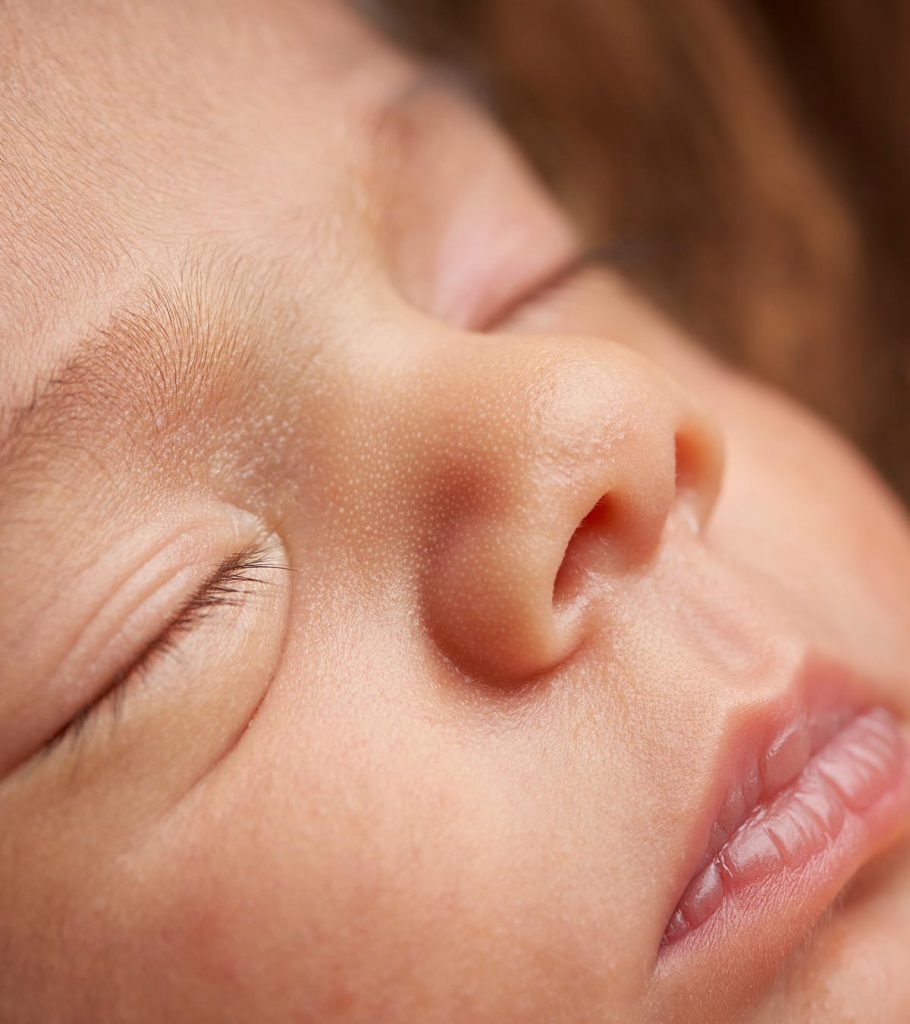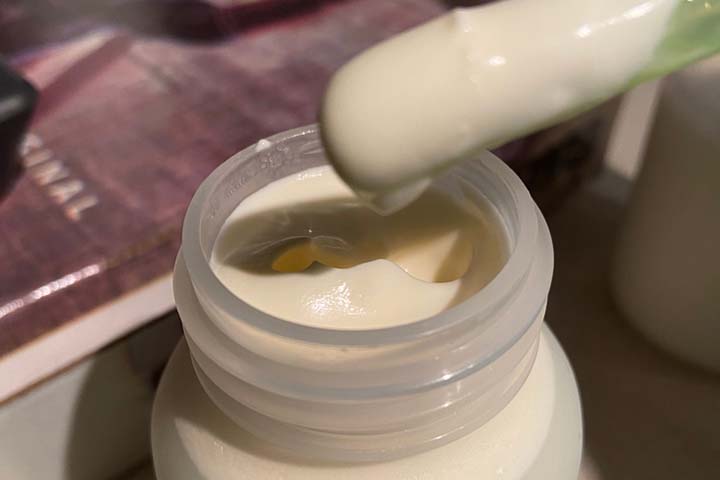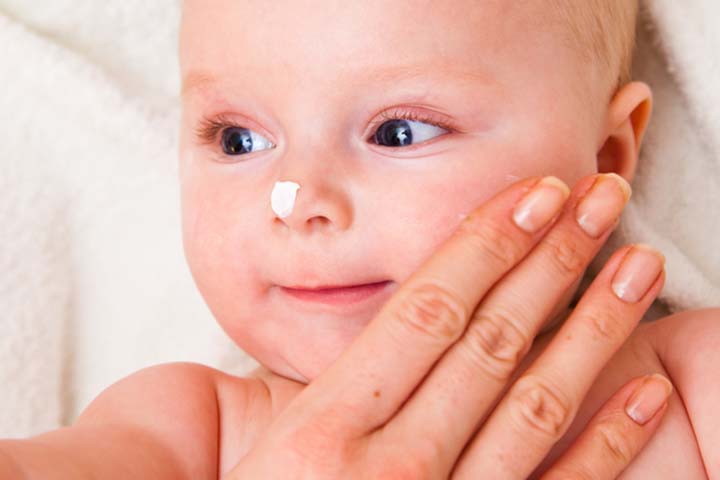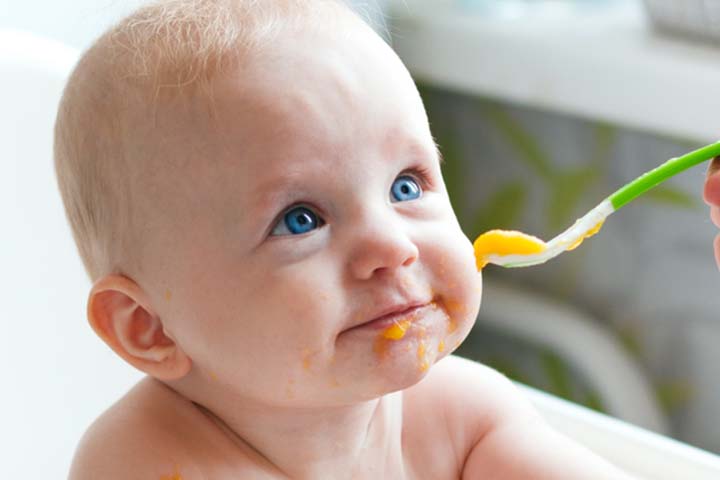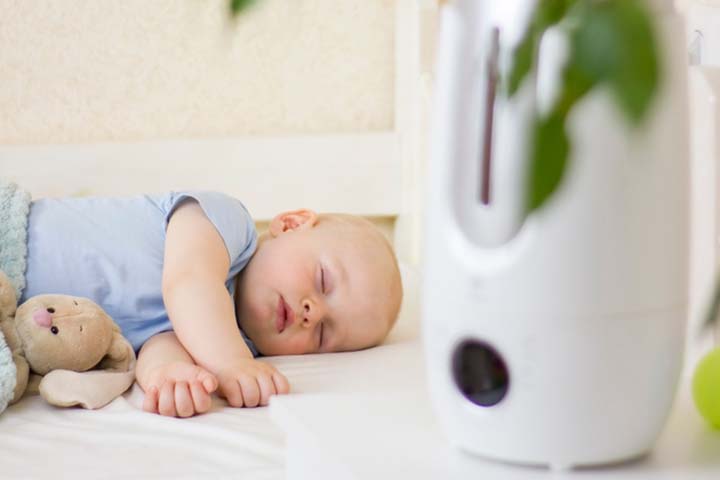It is common to see chapped lips in babies, especially during winters. It may be more prevalent in places with low humidity. Babies who naturally tend to lick their lips may also experience chapped lips. While adults commonly use lip balms to manage their dry lips, are they safe for babies as well?
Read this post as we talk about the causes, home remedies, and prevention of a baby’s dry and chapped lips.
What Causes Chapped Lips In Babies?
Common reasons behind dry and chapped lips in babies include:
- Dry weather, which is the most common cause of chapped lips among babies. During the winter season or whenever there is a decrease in humidity, lips tend to crack and harden. If you live in a place with low humidity, then the baby can have chapped lips any time of the year. Dry weather rid the lips of moisture, thus leading to chapping.
- Prolonged exposure to wind and sun can also cause the lips to lose their moisture, resulting in dryness (1). One such scenario is when the baby spends too much time at the beach.
- Frequent lip-licking may cause the lips to lose moisture. The saliva evaporates rapidly, leaving the lips stretched and dry (2).
- Dry and cracked lips are among the many signs of dehydration in babies (3). Other symptoms of severe dehydration, such as lethargy and weakness, are bound to get your attention before chapped lips.
- Kawasaki disease is a rare form of vasculitis, which is an inflammation of the blood vessels. It mostly affects infants and even newborns. One of the several symptoms of the disease is red, cracked, and dry lips (4). Infants with Kawasaki disease almost always have high fever and irritability which are hard to miss. The disease is rare, and the reason behind it is unknown.
- Nutritional deficiency: Sometimes, chapped lips could indicate a deficiency of a nutrient, such as vitamins A and B. This is uncommon but possible to happen in babies. This is more likely to be the cause in cases of chronic lip chapping. In case your baby is suffering from chronic lip chapping, it is wise to consult a pediatrician to address any nutritional deficiency.
- Sucking blisters: Lips of breastfed babies may resemble chapped lips due to constant friction with the breast. They may even develop blistersiXA painful skin condition where the affected area is covered in raised, fluid-filled bubbles.. These are harmless, and nothing needs to be done actively.
If your baby or toddler has other severe symptoms, then it is best to take them to a doctor. Newborn chapped lips are usually a result of benign reasons rather than acute illnesses and can be dealt with right at home, with a few safe solutions.
acute illnessesiXConditions that occur suddenly and last for a short time.
Home Remedies For A Baby’s Chapped Lips
If your baby is otherwise healthy, then the following are the best and safest methods to treat chapped lips in babies. By following these simple lip care steps, you can help keep your baby’s lips healthy, soft, and free from chapping:
- Breast milk: Breast milk is rich in water and fats that aid in healing and hydrating a baby’s dry lips. Store a tiny quantity of expressed breast milk to apply on the baby’s lips. Dip your clean finger in the milk and apply a thin layer on the baby’s lips at least 2-3 times every hour. Don’t store for more than four hours at room temperature.
- Infant formula: If your baby is on formula, you may also use it for chapped lips. Make a thick paste of infant formula and store it to treat the baby’s chapped lips. The formula’s fat, combined with added water, acts as a moisturizer to help soothe chapped lips. Apply the formula paste with a clean finger several times in an hour, depending on the severity of the chapped lips.
- Pediatric petroleum jelly: Baby petroleum jellies are not regulated by the FDA (6). So, the use of petroleum jelly for relieving chapping should be done under pediatric guidance.
- Baby-safe lip balms: Baby-safe lip balms are available over the counter. Their use, however, should be done under pediatric guidance. Discuss the safe ingredients that you must look for in the balm. For babies, opting for lip balms made of natural ingredients can help reduce irritation and provide a safer option.
- Hydration: As drying and chapping of lips could happen due to dehydration, keeping your baby hydrated is essential (7). For babies below six months of age, exclusive breastfeeding is a must. Whereas, for babies over six months of age, fluid intake from various sources like thick soups and fruit and vegetable purees could ensure hydration.
Breast milk and formula are the best remedial methods for chapped lips since they do not pose a health risk when licked or swallowed by the baby. Treatment of underlying conditions, such as dehydration, will be symptomatic while treatment for Kawasaki disease involves the use of several medicines.
What Not To Apply On The Baby’s Chapped Lips?
Coconut oil has emollient properties. emollient propertiesiXThe quality of soothing and softening the skin.. Hence its use to provide some relief from chapped lips is common (8). However, you should not apply baby oil, lotions, and even natural remedies such as coconut oil without pediatric consultation.
Lanolin is a common remedy used by breastfeeding mothers to alleviate nipple soreness (9). It might cause poisoning when ingested, but the effects depend on the amount of lanolin ingested. Medical-grade lanoliniXNatural moisturizing wax extracted from sheep’s wool. carries much less risk of poisoning (10). Thus, its use must be done under pediatric guidance only.
When To See A Doctor?
Usually, chapped lips are not a matter of concern. However, if you see any of these other symptoms associated with chapped lips, consult a pediatrician.
- Sore, red, and dry lips
- Chronic chapping that is increasing with time
- Bleeding lips
- Baby is unable to feed
- Baby is fussy and cranky
- Other problems such as high fever, diarrhea, or vomiting
Some causes, such as dehydration or nutritional deficiency, could be causing the above-mentioned symptoms. These need to be addressed promptly to avoid any complications further.
How To Prevent Chapped Lips In Babies?
Maintaining a regular feeding schedule allows your baby’s lips to stay hydrated by breast milk. Another way to prevent chapped lips is by keeping adequate ambient humidity. Cool-mist humidifiers help you achieve it.
Install a cool-mist humidifier in your baby’s room, especially during the dry seasons, when there is a rapid drop in water vapor content. Pediatricians recommend using a cool-mist humidifier and ask to stay away from hot-mist/steam humidifiers that increase the chances of burn (11). Sufficient humidity means well-hydrated and smooth lips.
Dry weather conditions, dehydration, or licking lips frequently may cause chapped lips in babies. This is seldom a cause for concern and may be addressed by applying breast milk or formula paste on a baby’s lips multiple times a day. Try using humidifiers to maintain ambient humidity during dry seasons. However, if the condition becomes severe or causes bleeding, check with your child’s pediatrician to get any underlying health issue diagnosed. Baby safe petroleum jelly or lip balms are available over-the-counter, but it is advisable to use them only under a pediatrician’s guidance.
Key Pointers
- Chapped lips in babies are caused due to dry weather or frequent lip-licking.
- You may apply infant formula, pediatric petroleum jelly, or breastmilk to treat them.
- Parents need not worry as it is a manageable condition.
